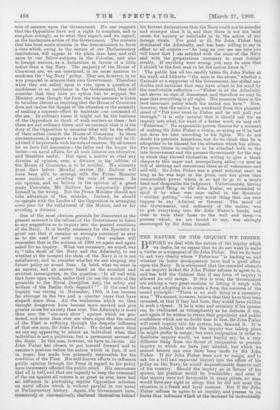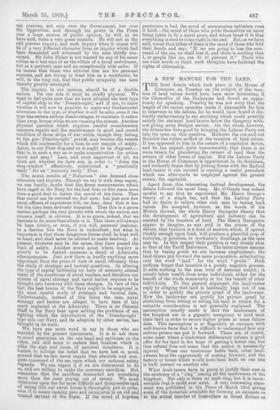THE NATURE OF THE INQUIRY WE DESIRE. B EFORE we deal
with the nature of the inquiry which we desire, let Us repeat that we do not want to make a victim or a scapegoat of Sir John Fisher. But we do want to ask very clearly where " Fisherism " is leading us, and whether its latter developments have had a good effect upon the Navy. It is whispered that the essential obstacle to an inquiry is that Sir John Fisher refuses to agree to it, and has told the Cabinet that if any form of inquiry is allowed he will resign. If this is true, the Government are making a very great mistake in letting it weigh with them, and adopting in so crude a form the converse of the sound principle : "There is no such thing as a necessary man." We cannot, however, believe that they have thus been menaced, or that if they had been, they would have yielded to such a threat. If he is wise, and certainly if his system can be vindicated as triumphantly as he declares it can, and again if he wishes to retain that popularity and public confidence which are no doubt dear to him, Sir John Fisher will court inquiry into his system, nay, demand it. It is possible, indeed, that while the inquiry was taking place he might prefer to resign ; but such resignation in order to facilitate inquiry would, we need hardly say, be a very different thing from the threat of resignation to prevent inquiry to which we have just alluded, but which we cannot believe can ever have been made by Sir John Fisher. If Sir John Fisher were now to resign, and to ask for a full and impartial iriquiry into the effect of his policy on the Navy, he would unquestionably deserve well of his country. Should the inquiry go in favour of his system, his position would be irresistible ; and even that inquiry were not favourable in many points, no man would have any right to allege that lie did not meet the situation in a frank and loyal manner. But if Sir John Fisher refuses to agree to an inquiry, and presses to its limits that influence which at the moment he undoubtedly can exercise, not only over the Government, but over the Opposition, and through his power in the Press over a large section of public opinion, he will, as we have said, make a very great mistake. • He will not in the end prevent inquiry, and such inquiry when it comes will be of a very different character from an inquiry which had been demanded and welcomed by the man chiefly con- cerned. Sir John Fisher is not treated by any of his saner critics as a bad man or as the villain of a naval melodrama, but as a patriotic man and an exceptionally able sailor. If he insists that those who criticise him are his personal enemies, and are trying to treat him as a malefactor, he will, in the long run, find that public sympathy has been thereby greatly estranged.
The inquiry, in our opinion, should be of a double nature. On one side it must be chiefly physical. We want to feel quite sure that we have adopted the best type of capital ship in the 'Dreadnought,' and if not, to know whether it will now be possible to make any fundamental alteration in the type, or whether it will be safer, even if the type has certain serious disadvantages, to maintain it rather than swap horses while we are crossing the stream. Another physical question which requires careful consideration concerns repairs and the maintenance in good and sound condition of those ships of war which, though they belong to the pre-' Dreadnought' period, may become the vessel -which will confessedly for a time be our margin of safety. Again, is our Fleet disposed as it ought to be disposed,-.-- that is, in such a way as to make concentration for action quick and easy ? Last, and most important of all, we must ask whether we have not, in order tJ "dress the shop-window" effectively, substituted a "practically ready" for an " instantly ready" Fleet.
The nioral results of " Fisherism " also demand close attention and inquiry. Though wo say it with deep regret, We can hardly, doubt that the fierce controversies which have raged in the Navy for the last four or five years have done a good deal to injure the moral of. the force. That that moral can be restored we feel sure; but just now few naval officers of experience will, we fear, deny that it has for the time been seriously impaired. That this is a grave matter, perhaps the very gravest with which the nation can concern itself, is obvious. It is HO grave, indeed, that we hesitate to do more than allude to it. That there will always he keen rivalry, or even if you will, personal jealousy, in a Service like the Navy is undoubted ; but what is important is that those dangerous forces shall be kept well in hand, and shall never be allowed to make headway. Al present, whatever may be the cause, they have passed the limit of safety. Another moral point where inquiry is greatly to be desired concerns a detail of Admiralty administration. Just now there is hardly anything more important from the point of view of naval efficiency than the study of strategic and tactical questions. In altering the type of capital battleship we have of necessity altered %Puny of the conditions of nasal warfare, and therefore our system of naval strategy aud naval tactics requires to he brought into harmony with these changes. In view of this fact, the best brains of the Navy ought to be employed in the most careful study of strategic and tactical data. Unfortunately, instead of this being the case, naval strategy and tactics are alleged to have been of late much neglected at the Admiralty. There is no General Staff in the Navy bent upon solving the problems of sea fighting which . the introduction of the 'Dreadnought' type into our Navy, and its adoption by other navies, hae brought in its train.
We have one more word to say to those who are troubled by the present discontents. It is to ask them to avoid pessimism on the one hand and optimism on the other, and still more to eschew that fatalism which is alike the sign and cause of national decadence. It is foolish to indulge the belief that we have lost so much ground that we can never regain that absolute and com- plete command of the sea. upon which our national safety depends. We can regain it if we are determined to do so, and are willing to make the necessary sacrifices. But remember that the sacrifices demanded are something more than the mere paying out of money. We must determiue upon the far more difficult aud disagreeable task Of seeing that our naval house is thoroughly put in order, even if it means causing pain and annoyance to an old and trusted servant of the State, If the wool. of hopeless pessimism is bad, the mood of unreasoning optimism runs it hard,—the mood of those who pride themselves on never being taken in by a naval scare, and whose boast it is that everything is sure to come right in the end. But, as we have said, worse than either of these is the Mood of those who fold their hands and say : ",If we are going to lose the com- mand of the sea, we shall lope it, and there is nothing that I, or people like me, can do to prevent it." Those who use such words or think such thoughts have forfeited the rights of citizenship.











































 Previous page
Previous page